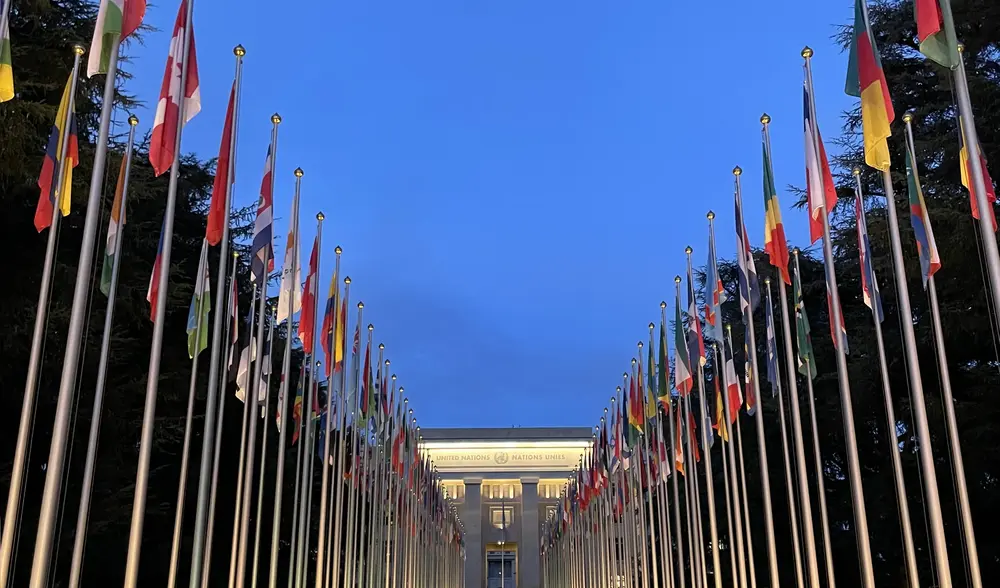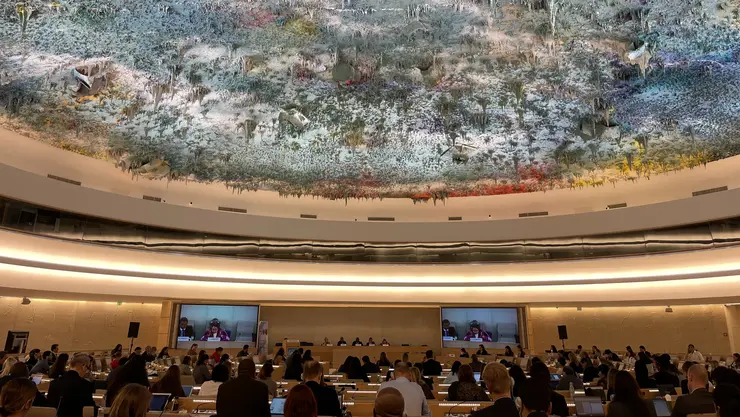Are the binding legal instruments enough? Reflections from the 11th UN Forum on Business and Human Rights

Last month (28 - 30 November 2022) the 11th UN Forum on Business Human Rights (BHR)1 was held in Geneva. Carla Cabanillas, a second-year MPP student at WBS and research assistant at the BHR Global Justice Clinic at the University of Erfurt, shares some reflections on this important event.
The idea that all business activity should respect human rights - of the community where it operates, of its workers and even of third parties in the case of supply chains - seems to be obvious. However, reality shows an alarming number of human rights violations by transnational corporations, particularly in the Global South2. That is why the central theme at this year's UN Forum on Business and Human Rights was the rightsholders' perspective. Representatives of indigenous peoples, the LGTBIQ+ community, and populations affected by extractive activities, among others, played a leading role in the three days of sessions in Geneva.
Most of the panels agreed that, although the way of doing business has changed in a positive sense in recent years, the United Nation Guiding Principles (UNGP), which guided States and companies in this task for more than 11 years after its approval, have been insufficient3. The Forum emphasized the need for an international legally binding instrument (LBI) to regulate the activities of companies, establishing mandates for the inspecting of its implementation and concrete sanctions in case of non-compliance.
But is an LBI the solution? Probably in those countries where the legal system is strong, the right of access to justice is reasonably guaranteed and the cost of evading a rule outweighs the benefit, it is, in part, the right way to go - as long as the participation of rightsholders in this regulatory process is guaranteed4. And it seems that the open-ended intergovernmental working group (OEIGWG)5 is going in that direction. The latest draft of the treaty states as one of its purposes "clarify and facilitate effective implementation of the obligation of States to respect, protect, fulfil and promote human rights in the context of business activities, particularly those of transnational characters" (art. 2.1). To achieve this objective, it obliges states parties to pass domestic laws and implement adequate systems to guarantee access to justice for victims of human rights abuses by companies.
This draft, among other important aspects, clearly establishes the rights of victims, the protection that the State must guarantee them, as well as the preventive actions that “States Parties shall provide their courts and State-based non-judicial mechanisms, with the necessary jurisdiction competence in accordance with this (Legally Binding Instrument) to enable victims to access to an adequate, timely and effective remedy and access to justice, and to overcome the specific obstacles which women, vulnerable and marginalized people and groups face in accessing such mechanisms and remedies” (art.7.1)6.
However, when this international regulation is finally approved, would it be enough in those countries where compliance with the law is not the rule and enforcement systems are weak? Let us look, for example, at the case of Latin America in the context of natural resource extraction.

“Rights are not mere gifts or favours, motivated by love or pity, for which gratitude is the sole fitting response. A right is something demanded or insisted upon without embarrassment or shame”
Feinberg, 1973, p. 58-59
In this region, there are many extractive activities carried out in the territories of indigenous peoples. They have the right to free, prior and informed consultation concerning any activity that may affect them directly or indirectly, as recognized at the international level and also at the domestic level in Peru, Bolivia, Colombia, and Guatemala, to mention just a few. Despite the existence of regulations, this right is widely violated, both by the State and by companies, which leads to constant social conflicts7.
Does this mean that LBI and domestic laws that oblige companies to implement due diligence will not be effective? Not necessarily, if these regulations are carried out with the due representation and participation of rightsholders, establish proportional sanctions, mechanisms for prevention, mitigation and remediation of human rights violations, supervision by an independent state entity is ensured as well as the possibility of access to the jurisdiction of the countries where the companies originate - which usually have stronger justice systems - a higher level of effectiveness would be achieved.
But some of these elements are still absent in domestic regulations already passed, for example, even the newly passed German Supply Chain Due Diligence Act (GSCDDA) does not provide for the possibility of civil liability actions against companies that violate human rights. Furthermore, the mechanisms provided in the law for remediation do not seem sufficient, insofar as affected parties are not consulted in this process, nor is stakeholder participation mandatory to assess the risk to human rights. Moreover, among other absences, there is no express mention of addressing gender-based violence or rights related to indigenous peoples8.
As the lawyers and policymakers of the Global South know well, the solution requires broader - and more creative - responses than the mere passing of laws. However, an adequate design of such laws is still important; at this point, I agree with the idea shared by Fernanda Hopenhaym as moderator of various panels at the last UN forum on BHR: "we must transfer the pillars of transitional justice to this matter: truth, justice, reparation and non-repetition". And this cannot be done without clear rules, stakeholder participation and guaranteed access to justice. The OEIGWG is expected to cover these aspects properly in the framework of the BHR Treaty process.
From a personal learning perspective, I am grateful to be offered a chance to attend a UN Forum for the first time. It is a unique opportunity for me as a public policy student. It is not only for the content of the panels but also for the possibility of meeting people who are interested and work directly on Business and Human Rights. Also, it was enriching to listen and meet with stakeholders.
Bibliography
Christliche Initiative Romero e.V. (CIR). (2019). Der deutsche Rohstoffhunger und seine menschenrechtlichen Folgen im Globalen Süden. https://www.ci-romero.de/produkt/studie-der-deutsche-rohstoffhunger-2/
Feinberg, J. (1973). Social Philosophy (Foundations of Philosophy Series). Prentice-Hall.
Guevara Gil, A., & Cabanillas Linares, C. (2019). Mineralizing the Right to Prior Consultation: From Recognition to Disregard of Indigenous and Peasant Rights in Peru, Global Jurist, 20(1), 20190019. doi: https://doi.org/10.1515/gj-2019-0019
Human Right Council. (2022). Text of the third revised draft legally binding instrument with the textual proposals submitted by States during the seventh session of the open-ended intergovernmental working group on transnational corporations and other business enterprises with respect to human rights. Forty-ninth session. 28 February – 1 April. A/HRC/49/65/Add.1 https://documents-dds-ny.un.org/doc/UNDOC/GEN/G22/268/13/PDF/G2226813.pdf?OpenElement
Initiative Lieferkettengesetz (2021). “Not there yet, but finally at the start: What the new supply chain act delivers – and what it doesn’t”. https://lieferkettengesetz.de/pressemitteilung/german-parliament-passes-supply-chain-law/
Lichuma, Caroline. (2021). (Laws) Made in the ‘First World’: A TWAIL Critique of the Use of Domestic Legislation to Extraterritorially Regulate Global Value Chains. Zeitschrift für ausländisches öffentliches Recht und Völkerrecht / Heidelberg Journal of International Law. 81.
Schönfelder, D & Grabosch, R. (2021). Das Lieferkettensorgfaltspflichtengesetz: neue Pflichten zur Vermeidung menschen- und umweltrechtlicher Risiken weltweit. Arbeit und Recht (AuR) S. 488-494
Vandenbussche, P. (2022). Derechos Humanos, debida diligencia y cadenas de suministro de empresas alemanas que operan en Perú. Los casos de Monsanto/Bayer, Heinz-Glas, Artesco, Faber Castell, Aurubis, Siemens y Productores de bananas. Documento de Trabajo. EQUIDAD, Centro de Políticas Públicas y Derechos Humanos. Lima.
1 I appreciate the helpful comments made by Professors Michael Riegner and Daniel Schönfelder. The opinions are my own and any inaccuracies or errors are entirely my responsibility.
2 See the various reports of the UN Working Group on Business and Human Rights: https://www.ohchr.org/en/special-procedures/wg-business/reports-and-other-documents#hrc
3 In the German case, for example, only 13-17% of large corporations voluntarily comply with the UNGP. See: Robert Grabosch & Daniel Schönfelder (2021), Das Lieferkettensorgfaltspflichtengesetz: neue Pflichten zur Vermeidung menschen- und umweltrechtlicher Risiken weltweit, AuR, S. 488-494.
4 On the controversy of creating rules from the Western Culture for the Global South and its implications on “the (white) Savior Complex”, see: Caroline Lichuma (2021), (Laws) Made in the ‘First World’: A TWAIL Critique of the Use of Domestic Legislation to Extraterritorially Regulate Global Value Chains.
5 The OEIGWG was established by HRC Resolution 26/9 of June 2014 with the mandate “to elaborate an international legally binding instrument to regulate, in international human rights law, the activities of transnational corporations and other business enterprises”.
6 Human Right Council, (2022). Text of the third revised draft legally binding instrument with the textual proposals submitted by States during the seventh session of the open-ended intergovernmental working group on transnational corporations and other business enterprises with respect to human rights. A/HRC/49/65/Add.1 https://documents-dds-ny.un.org/doc/UNDOC/GEN/G22/268/13/PDF/G2226813.pdf?OpenElement
7 See for example the situation in which the indigenous communities of Guatemala live due to the extraction of palm oil in their territories, more than 90% of the exports of which end up in Spain, Germany and the Netherlands: Christliche Initiative Romero e.V. (CIR). (2019). Der deutsche Rohstoffhunger und seine menschenrechtlichen Folgen im Globalen Süden. https://www.ci-romero.de/produkt/studie-der-deutsche-rohstoffhunger-2/ or the following study of mining projects showing how the Peruvian State and mining companies used administrative mechanisms to prevent the free, prior and informed consultation of indigenous and peasant communities: Armando Guevara & Carla Cabanillas (2019), Mineralizing the Right to Prior Consultation: From Recognition to Disregard of Indigenous and Peasant Rights in Peru, Global Jurist, 20(1), 20190019. doi: https://doi.org/10.1515/gj-2019-0019
8 See the press statement from June 2021: “German Parliament passes Supply Chain Act: “Not there yet, but finally at the start” - Initiative Lieferkettengesetz, https://lieferkettengesetz.de/pressemitteilung/german-parliament-passes-supply-chain-law/

Carla Cabanillas is a second-year MPP student at the WBS. She is an advocate for the rights of vulnerable populations, particularly women and indigenous peoples, with experience in gender policy implementation and research on intercultural issues and extractive industries in the Andes. Currently, she is working as a research assistant at the Global Justice Clinic on Business and Human Rights at Erfurt University.
~ The views represented in this blog post do not necessarily represent those of the Brandt School. ~